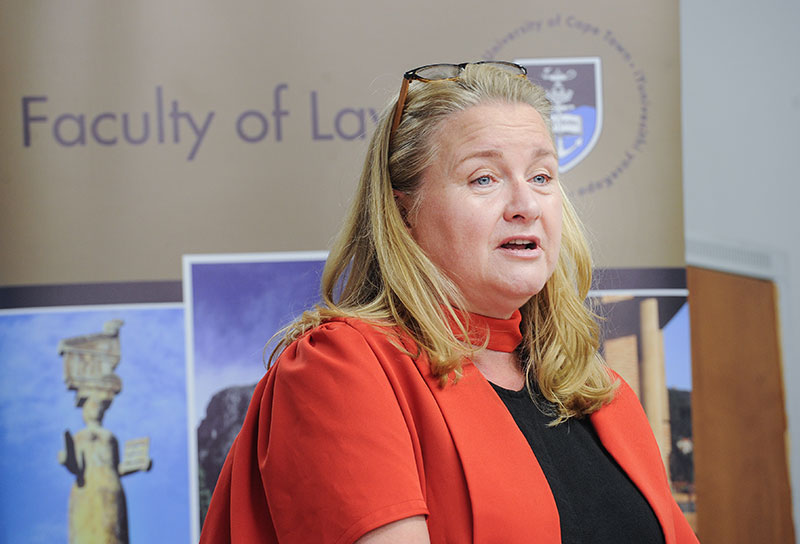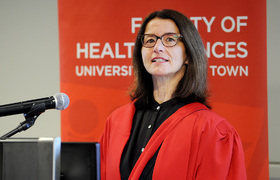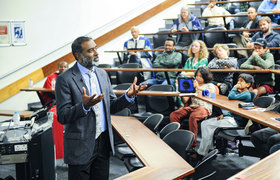Inaugural lecture: Shareholders, stakeholders and company law reform
10 October 2023 | Story Helen Swingler. Photos Lerato Maduna. Read time >10 min.When Professor Jacqueline Yeats began teaching at the University of Cape Town (UCT) 20 years ago, concepts such as sustainability, corporate social responsibility, ethical corporate culture, stakeholder capitalism, and climate change either did not exist or were not regarded as particularly relevant to company law. Since then, the field has shifted seismically.
“These were not considered to be part of mainstream commercial [law] practice, nor of the formal company law curriculum at UCT,” said Professor Yeats at her 27 September inaugural lecture.
Yeats is the director of the Corporate Law and Governance Unit (CLGU), which she was instrumental in founding in the Faculty of Law’s Department of Commercial Law.
Titled, “Value(s), Vices and Voice – how the evolution of modern company law reflects shifting societal values in a changing world”, the lecture was hosted at the faculty and forms part of the UCT Inaugural Lecture Series.
Her lecture highlighted why these external factors and pressures now present a strategic concern for corporates – and their directors. The concepts are central to two courses the Distinguished Teacher Awardee teaches in the faculty.
Inclusive capitalism
Corporate governance experts predict that in South Africa, environmental, social, and governance (ESG) will become increasingly important in company law as companies and their directors shift towards more stakeholder-inclusive capitalism.
“The proper role of the company in modern society is one of the most vital and important current debates in the field.”
ESG-related shareholder activism, through litigation and other corporate engagement, is likely to become more prevalent and sophisticated. Investors are increasingly applying these non-financial factors in their analysis when identifying material risks and growth opportunities in the corporate realm, Yeats said.
“The proper role of the company in modern society is one of the most vital and important current debates in the field.”
Long line of court decisions
Tracking over a century of development in company law, Yeats highlighted some complex issues, particularly the duty of company directors to act in the best interests of the company and how the evolution of this concept has impacted shareholders and other stakeholders. The meaning of the phrase has been developed by a long line of court decisions going back more than 150 years.
As early as 1902, company law in the United Kingdom (UK) and South Africa was clear: the proper role of directors when acting in the best interests of the company lay in adopting a shareholder-centric approach, which generally meant maximising profit for the shareholders.

This approach attracted heated debates and disagreement in legal circles with scholars such as Harvard Law School’s Professor Merrick Dodd questioning the logic of obliging directors to act primarily for the shareholders.
Another school of thought emerged, aligned to the concept of corporate social responsibility. This asked directors to look beyond shareholders and to include stakeholders such as company employees, customers, suppliers, creditors, local communities and the environment – the stakeholder approach.
Sweeping corporate governance reform
The debate resumed in earnest in the late 1980s and 1990s, triggered by sweeping corporate governance reforms across the world, said Yeats.
In South Africa, the pivotal law governing the duty and standard of conduct expected of directors is regulated by the common law and Section 76 of the Companies Act of 2008.
“It compels them to act honestly, in good faith and in a manner they reasonably believe to be in the best interests of, and for the benefit of, their companies,” said Yeats. “But the phrase ‘in the interests of the company’ is deceptively simple, and understanding and interpreting what it means lies at the heart of what is expected of a director.”
In recent years, the UK and South Africa have undertaken major company law reform projects to modernise their company laws. These also attempted to define what is meant by ‘the company’ in ‘the best interests of the company’. The shareholder/stakeholder debate was a core feature of the reform deliberations.
UK company law reform drafters identified three possible approaches to the issue:
- shareholder primacy, a traditional approach premised on the idea that directors are obliged to ensure wealth maximisation for shareholders, the sole owners
- the enlightened shareholder value approach; here directors maximise profits to benefit shareholders, but with the qualification that directors may take the interests of stakeholders into account
- the stakeholder or pluralist approach where shareholders are viewed as merely another stakeholder; here, directors may be required to forgo shareholders’ profits, if necessary, to advance other stakeholders’ interests.
In the UK Companies Act of 2006, the second approach was adopted. This considers the interests of employees and the impact of the company on the community and environment. Two years later, South Africa’s Companies Act ostensibly also adopted the enlightened shareholder value approach.
However, none of the detail which is contained in Section 172 of the UK Act was included in Section 76 of the South African Act and the provision states only that a director has a duty to act in the best interests of the company, said Yeats. “There was no further explanation as to what kind of considerations the discharge of this duty might entail.”
There are indications in the statute that support this interpretation. For example, Section 7(d) of the Companies Act states that one of its purposes is to reaffirm the concept of a company as a means of achieving economic and social benefits. The act also contains various provisions protecting stakeholders, such as employees and creditors in specific circumstances.
“However, these amendments are scattered throughout the act and there seems to have been no cohesive legislative approach to the various stakeholder protections which were introduced in this way,” Yeats noted.
Good corporate citizenship
One notable feature of the act was the creation of the Social and Ethics Committee (SEC) for companies of a certain size and which have a significant social impact. SECs are ‘watchdogs’ for a company’s social and economic development, good corporate citizenship, environmental health and public safety. Well and good, said Yeats, but too often these functions of these committees are regarded as mere box-ticking exercises. Research by one of her master’s students showed that many companies opt for cut-and-paste templates and content for their SEC reporting.
The challenging global social, environmental and economic climate has seen the stakeholder/shareholder debate intensify in the past decade. In 2019, the United States’ (US) Business Roundtable (BR), a non-profit organisation of more than 200 top US chief executive officers (CEOs), took the bull by the horns. They issued a declaration of corporate purpose that apparently turned the traditional shareholder primacy view of corporations on its head, sending ripples around the world.
Their statement, signed by 181 CEOs, committed them to leading their companies for the benefit of all stakeholders: customers, employees, suppliers, communities and shareholders. Prominent dissenting legal scholars have criticised some of the stakeholderism developments as being potentially counterproductive and labelled the BR declaration a mere public relations exercise.
“More and more investors use ESG criteria to evaluate companies and guide their investment decisions.”
Yeats believes it is no longer possible to sensibly discuss company law without referring to the issue of ESG credentials and frameworks.
“More and more investors use ESG criteria to evaluate companies and guide their investment decisions. ESG investing has grown exponentially in the past five years.”
Studies have shown that companies that address ESG issues, particularly those salient to their businesses, outperform those that do not, making ESG increasingly important for securing debt and equity capital. And there is eye-watering money involved. Global ESG investment exceeded US$40 trillion in 2022 and predictions are that these will reach the US$50 trillion mark by 2025.
Expanding but complex regulations
In South Africa, ESG concerns include climate change, energy, water scarcity and usage, biodiversity, destruction of natural habitats, pollution and waste management. The social issues encompass employment and labour, employee benefits, diversity, health and safety, human rights and community relations. Key governance matters are corporate structure and management, strategic direction and oversight, compliance, and anti-bribery and corruption measures.
“ESG regulation is now a complex and rapidly expanding area of compliance in most jurisdictions, including South Africa, as companies have various ESG-related reporting obligations,” said Yeats. “And with increasing awareness of ESG issues, companies can expect far greater engagement from other stakeholders on these issues.”
But litigation risks loom large for those companies whose ESG reporting is misleading or inaccurate. This has created a “veritable rainbow of dirty laundry”, she said. There have been instances of traditional greenwashing, blue washing (companies signing up to the United Nations [UN] Global Compact without intending to follow its principles), pink washing (fore-fronting LBGTQI+ practices and policies), and social washing (companies espousing social consciousness).
“We will need to make sure we get it precisely right or it may make matters worse.”
ESG-related shareholder activism through litigation and other corporate engagement is likely to become more prevalent and sophisticated. As a result, sustainability disclosures and reporting will continue to remain an area of focus with a gradual shift towards more standardised reporting, Yeats noted.
But as recent court cases around the world have shown, the duties of directors in corporations raise competing and incredibly complex demands and trade-offs between shareholders and stakeholders, often creating murky legal territory. South African company directors owe their duties to the company, not to the shareholders or any other set of stakeholders.
Yeats no longer believes that the best approach would be to amend the South African Act to adopt a detailed legislative approach as the UK has done in 172 of the Companies Act of 2006. This section is used as a tool to steer UK company directors’ decisions to promote the success of the company, but it is not essential to amend our act to achieve this.
“If we do decide to amend the South African section, we will need to make sure we get it precisely right or it may make matters worse by inadvertently creating more confusion and reducing the flexibility and discretion in decision making that directors currently have. It will also add another layer of regulation and compliance to the heavy burden companies already carry.”
 This work is licensed under a Creative Commons Attribution-NoDerivatives 4.0 International License.
This work is licensed under a Creative Commons Attribution-NoDerivatives 4.0 International License.
Please view the republishing articles page for more information.











